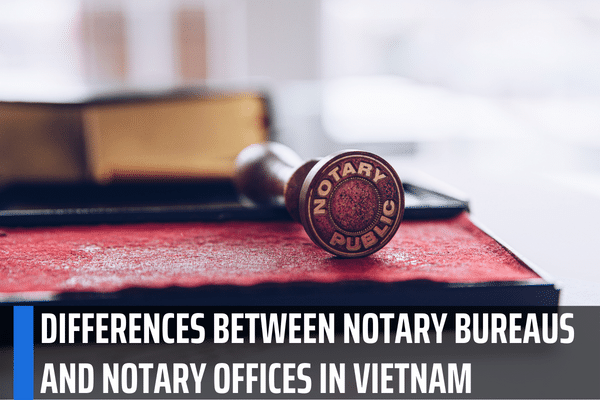Vietnam: What are the differences between notary bureaus and notary offices according to the provisions of the Law on Notarization 2014?
What are the notary bureaus in Vietnam?
Article 19 of the Law on Notarization 2014 provides for specific notary bureaus as follows:
"Article 19. Notary bureaus
1. Notary bureaus shall be established under decisions of provincial-level People’s Committees.
2. Notary bureaus are public non-business units attached to provincial-level Justice Departments, and have their own offices, seals and accounts.
The at-law representative of a notary bureau is the head of such notary bureau. Heads of notary bureaus must be notaries and shall be appointed, relieved from duty and dismissed by chairpersons of provincial-level People’s Committees.
3. The name of a notary bureau must contain the words “notary bureau” followed by the ordinal number of its establishment and the name of the province or centrally run city where it is established.
4. Notary bureaus shall use seals bearing no national emblem. Notary bureaus may have their seals carved and use them after obtaining establishment decisions. Procedures and dossiers of request for seal carving and management and use of seals by notary bureaus must comply with the law on seals.

Vietnam: What are the differences between notary bureaus and notary offices according to the provisions of the Law on Notarization 2014? (Image from the internet)
What are the notary offices in Vietnam?
Regarding regulations on notary offices, Article 22 of the Law on Notarization 2014 specifically provides as follows:
"Article 22. Notary offices
1. Notary offices shall be organized and operate in accordance with this Law and other relevant legal documents concerning partnerships.
A notary office must have at least 2 notaries being its partners. Notary offices have no capital contributors.
2. The at-law representative of a notary office shall act as its head. The head of a notary office must be a notary who is its partner and has practiced notarization for at least 2 years.
3. The name of a notary office must contain the words “notary office” followed by the full name of its head or another notary being its partner as agreed by all notaries who are partners, and must not be identical to or cause confusion with those of other notarial practice organizations and violate national historical and cultural traditions, ethics and fine customs.
4. Notary offices must have head offices satisfying the conditions prescribed by the Government.
Notary offices may have their own seals and accounts and shall operate on the principle of financial autonomy with their revenues coming from notarization charges, notarization remuneration and other lawful sources.
5. Notary offices shall use seals bearing no national emblem. Notary offices may have their seals carved and use them after obtaining establishment permission decisions. Procedures and dossiers of request for permission for seal carving and management and use of seals of notary offices must comply with the law on seals."
What are the differences between notary bureaus and notary offices in Vietnam?
Based on the above, it can be seen that the similarities and differences between the notary bureaus and the notary offices are as follows:
Similarities:
Notary bureaus and notary offices both may have their seals, bearing no national emblem, carved and used after obtaining establishment permission decisions.
Differences:
Establishment authority:
- For the notary bureaus, the People's Committee of the province has the authority to decide on the establishment
- For notary offices, a notary office is established by two or more notaries, organized and operated in accordance with this Law and relevant legal documents applicable to this type of notary. partnerships. The notaries participating in the establishment are notary public partners of the Notary Office. The notary office has no capital contributors.
Accordingly, the notary bureau is under the jurisdiction of the State, while the notary office is established by two or more notaries, so it is private.
Legal representative:
- For notary bureaus, the legal representative is the head of the notary bureaus. The head of the notary bureaus must be a notary and shall be appointed, relieved of duty or dismissed by the chairperson of the provincial-level People's Committee.
- For notary offices, the legal representative of the notary office is the head of the office. The head of a notary office must be a notary partner of the notary office and have practiced notarial practice for 2 years or more.
Name of a notary office/bureau:
- TThe name of a notary bureau must contain the words “notary bureau” followed by the ordinal number of its establishment and the name of the province or centrally run city where it is established.
For example: Notary bureau No. 5,...
- The name of a notary office must contain the words “notary office” followed by the full name of its head or another notary being its partner as agreed by all notaries who are partners, and must not be identical to or cause confusion with those of other notarial practice organizations and violate national historical and cultural traditions, ethics and fine customs.
For example: Van Thi My Duc Notary Office,...
Here is some of the information we provide to you. Best regards!
LawNet
